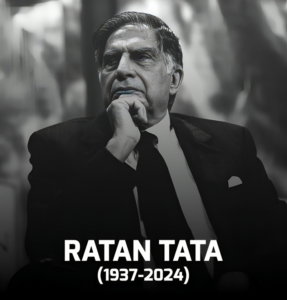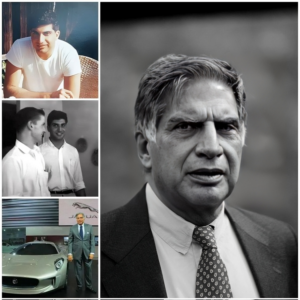Breaking News
Ratan Tata, National Icon and Visionary Leader, Passes Away at 86
Ratan Tata, National Icon and Visionary Leader passes away at 86.
Ratan Naval Tata, Chairman Emeritus of Tata Sons and one of India’s most respected industrialists passed away at the age of 86. Just days before, the business icon had dispelled rumors about his health, sharing via social media that he was undergoing routine medical check-ups due to his advancing age. In a heartfelt statement late Wednesday, Tata Sons Chairman N Chandrasekaran confirmed the news, honoring Tata’s immense contributions to both the Tata Group and the nation. Chandrasekaran expressed profound grief, remembering the industrialist as a mentor and guide whose leadership expanded the Tata Group’s global footprint while upholding its strong ethical values.
A Visionary Leader Remembered
“It is with a significant feeling of misfortune that we bid goodbye to Mr. Ratan Naval Tata, a genuinely extraordinary pioneer whose limitless commitments have formed the Goodbye Gathering as well as the actual texture of our country,” Chandrasekaran said in recognition. “Mr. Tata was more than just a chairman for the Tata Group,” he said. He was a friend, mentor, and guide to me. He established a long-term connection with his steady devotion to development, greatness, and genuineness.”
A Giant of Indian Industry and Philanthropy
Ratan Tata made contributions outside of the corporate world. Chandrasekaran stated that future generations would profit from his charitable endeavors in the fields of healthcare, education, and community welfare. Leading the country in homage to the industrialist, Prime Minister Narendra Modi described him as “an extraordinary human being and a compassionate soul.” In a series of tweets, PM Modi expressed his feelings and praised Tata for his kindness, humility, and commitment to further developing society.

Tributes Pour In From Across the Nation
Prominent political and corporate figures expressed their sadness over Tata’s demise. Calling him “a man with a vision,” Rahul Gandhi offered the Tata family his condolences. CEO Gautam Adani posted a heartfelt statement on social media, stating, “India has lost a giant. Legends like him never fade away.” The Mahindra Group Chairman, Anand Mahindra, expressed his sorrow, saying, “I am unable to accept the absence of Ratan Tata… his mentorship and guidance at this point would have been invaluable.”
As the chairman of Reliance Industries, Mukesh Ambani referred to Tata as “one of India’s most illustrious and kind-hearted sons.” Ambani said that he had greater respect for the morals and character of the industrialist after having personal encounters with Tata. Google CEO Sundar Pichai and Biocon founder Kiran Mazumdar-Shaw also sent condolences. Pichai gave Tata credit for shaping the future generation of business executives and for his enduring influence on the commercial and charitable landscapes of India.
The Journey of a Titan: Ratan Tata’s Life and Career
After Ratan Tata assumed the position of Chairman of Tata Sons in 1991, the company became a major player in the world economy. Under his leadership, Tata Group grew into a $100 billion conglomerate that included steel, vehicles, software, and telecommunications. One of his most significant accomplishments to date is the purchase of the British brands Jaguar and Land Rover in 2004, a pivotal move that made the Tata Grou an incredible phenomenon in switch imperialism.
Besides, Tata delivered on his pledge to the middle class in India when he presented the Tata Nano, the lowest-priced vehicle in the world at under ₹1 lakh.
2012 saw his retirement from the Tata Group, although he made a temporary comeback in 2016–2017 to help the business through a moment of upheaval. Tata continued to manage the philanthropic trusts of the group and was Chairman Emeritus of several important Tata firms, even though he stepped back from day-to-day operations.

A Heritage of Charity
Ratan Tata’s commitment to philanthropy is deeply rooted in the Tata family tradition, with contributions spanning education, healthcare, and rural development.In addition, he fought for animal rights, especially those of stray dogs, turning Bombay House into a sanctuary for them. His actions on social media demonstrated his sympathy. Tata gained popularity by using her platforms to spread messages of kindness, hope, and social responsibility. She has over 13 million followers on X (previously Twitter) and close to 10 million on Instagram.
Early Life and Personal Journey
Ratan Tata was born in 1937 and raised by his grandmother Navajbai Tata following his parents’ divorce in 1948. He studied architecture at Cornell University and then took a Harvard University course in management. Tata acknowledged that he had never been married but that he had been on the verge of doing so four times. One of his deepest relationships was with a woman he met while working in Los Angeles, but the 1962 Indo-China War prevented the union as her parents refused to let her move to India.
Honours and Recognition
Ratan Tata’s contributions were recognized with India’s highest civilian awards. He was awarded the Padma Bhushan in 2000 and the Padma Vibhushan, India’s second-highest civilian honor, in 2008.

Challenges and Controversies
There were difficulties during Tata’s term. Cyrus Mistry, who had succeeded Tata as Chairman but had been removed in a high-profile boardroom coup, passed away unexpectedly in 2022, rocking the economic world. When Mistry passed away, the conflict between Tata and Mistry was still unresolved.
A Lasting Influence
Ratan Tata’s life was marked by a dedication to uplifting society through both business and philanthropy. His deep commitment to the greater good, both in India and globally, will continue to inspire generations of leaders. His death marks the end of an era, but his legacy of integrity, compassion, and innovation will endure.












